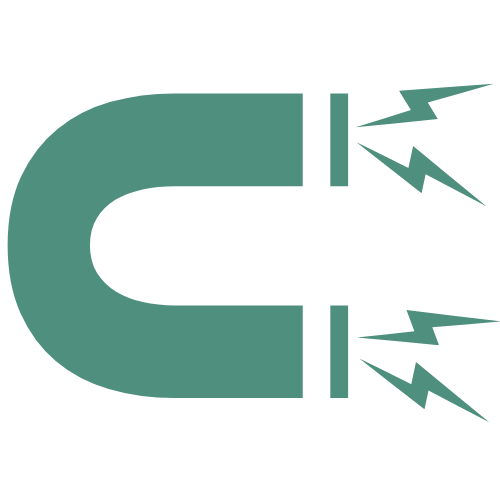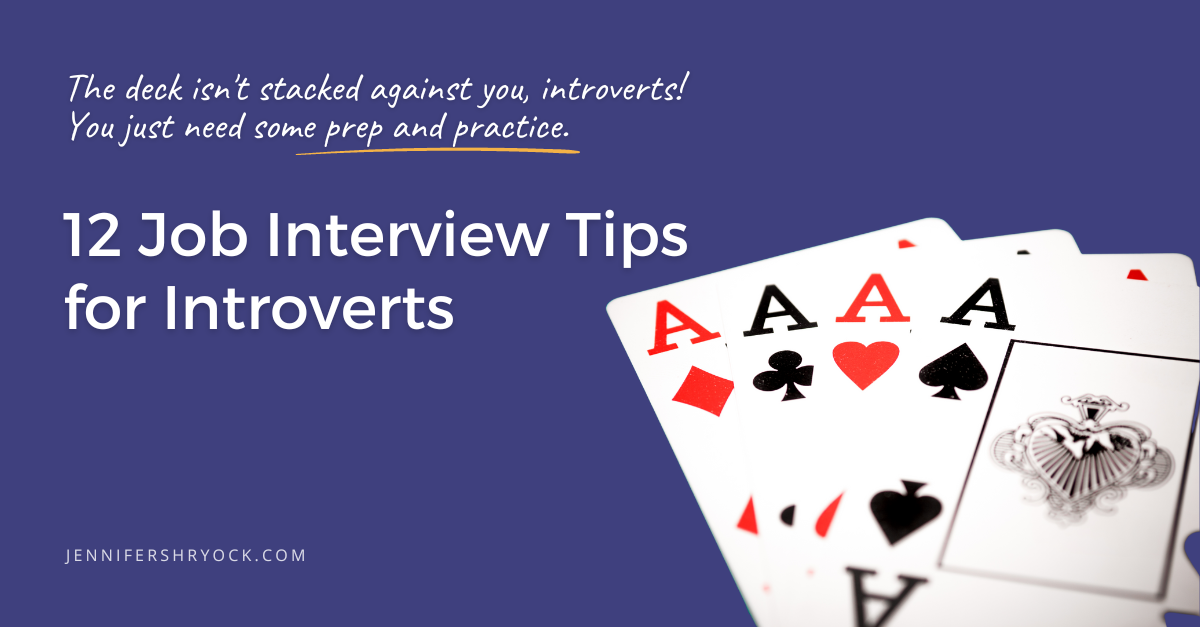TL;DR: Introverts can win their job interviews, too! Use my 12 tried-and-true tips to prepare for your interview and present yourself in the best light.
I love the thoughtful, creative, and detail-oriented nature of introverts — perhaps because I’m one, too!
But if you’ve ever been in an interview and found yourself with plenty to say but at a loss for the words to say it, your quiet, thoughtful nature can feel like a disadvantage, particularly when compared to the apparent confidence and enthusiasm of extroverts.
Tip:
Introverts are energized by alone time and drained by too much interaction.
Extroverts are energized by social situations and uncomfortable when left on their own for too long.
But stand tall, my fellow introvert! The deck is not stacked against you when competing for jobs. In fact, with some preparation and practice, you can present yourself as well as or better than an extrovert — I’ve seen it happen often.
Here are my top 12 interview tips for introverts to help you do exactly that.
Tips for the Days and Weeks Before Your Job Interview
1. Prepare well in advance.
Give yourself plenty of time to research the company where you’ll be interviewing, as well as the position you are interviewing for. With time to reflect and absorb the information, you’ll feel more confidence and at ease during the interview.
2. Practice, practice, practice.
Practice answering common interview questions with a friend, family member, or your interview coach. When the flow of conversation is familiar to you, you will feel more comfortable with the interaction, even when it’s with someone you don’t already know.
Tips for the Day of Your Job Interview
3. Manage your energy.
Plan quiet time before the interview so you feel refreshed when going into the interaction. This will allow you to make a strong connection with your interviewer and others.
Got a half-day or longer interview? Plan bathroom breaks to re-center and recharge.
4. Remember to be yourself.
Being an introvert is not a problem, a weakness, or a disadvantage. Your skills, experiences, and qualities are valuable, which you’ll convey throughout the interview. Be true to yourself and let the interviewer meet the true you.
5. Make a strong first and last impression.
Bookend the interview with confidence. As you enter the room, take a deep breath, make eye contact, smile, and offer a firm handshake. Leave the interview in a similar fashion: eye contact, a smile, and a strong handshake with a sincere thank you.
Finding Your Voice During the Job Interview
6. Take your time.
Your prep and practice got you comfortable with your answers, and it’s okay to pause for a moment before you voice them. You’re at your best when you don’t feel rushed, so take some time to gather your thoughts before sharing them.
7. Toot your own horn.
It’s not bragging to tell the interviewer what you’re great at and how it aligns with the position. They want and need to know the value you’d bring to the position, so tell them. Think of it as lifting the curtain so they can see the way you work.
8. Let others speak for you.
If it feels awkward or embarrassing to praise your work or list your achievements, share what other people have said about you and your work.
For example: “My prior supervisor appreciated X about my working style” or “Colleagues have said that my biggest strength as a team member is X.”
Tips for the Days After Your Job Interview
9. Send your thanks.
Don’t skip this step! Sending an email or thank-you note to show appreciation for the interviewer’s time is a rare and welcome gesture. It’s also a perfect time to reiterate your interest in the position.
10. Think it over.
Take some time to reflect on the interview. Did you present the true you? What can you celebrate from this interview? What can you improve on for the next one?
11. Keep in touch.
If you don’t hear from the interviewer in a week or so, don’t be shy about sending a quick note that asks about the status of your application. Showing your continued interest in the job will help keep you top of mind.
Tips to Stack the Deck in Your Favor
12. It’s okay to repeat yourself.
Don’t assume your interviewer has memorized your resume. You got the interview, so clearly your resume stood out among all the others, but that doesn’t mean your interviewer will recall all the relevant details.
With that, I highly recommend repeating things mentioned in your cover letter or on your resume! You can lead with, “As I mentioned in my cover letter…” or “As you might have seen on my resume…” It may feel repetitive, but telling your full story to the interviewer — even if you’ve told it in an earlier interview or in other documentation — is in service both to them and to your chances of getting hired.
I promised just 12 tips, but here’s one more thing to keep in mind…
13. Make it easy for them to choose you.
Your interviewer needs information about what you know, what you’ve done, and how you work to make the best decision about whom to hire — and you’re there to convey the information they need to recognize that you’re the best candidate.
Unless you’re applying for a very high-pressure job like a CIA agent, your interviewer is not trying to trip you up (and even then, they’re only trying to learn how you handle pressure). They want you to succeed because they want to hire the best person for the job — why not you?
If that sounds tricky or icky…
Try This!
Imagine that your interviewer is an extroverted friend of yours, and they’re going to go tell the hiring managers about you.
They already “get” you, they just don’t know all the details about your relevant experience, skills, and what you’re like to work with.
Share those details with your interviewer as someone you trust so they can go talk you up.
Let’s recap…
Being an introvert doesn’t automatically put you at a disadvantage for your job interview. The deck is not stacked against you for your job search.
With some preparation and practice, you can do just as well as an extrovert in a job interview and maybe even better.
Here are my 12 top job interview tips for introverts to guide your way—
Days or weeks before your interview:
- Prepare well in advance
- Practice, practice, practice
The day of your interview:
- Manage your energy
- Remember to be yourself
- Make a strong first and last impression
During your interview:
- Take your time
- Toot your own horn
- Let others speak for you
After your interview:
- Send your thanks
- Think it over
- Keep in touch
Stack the deck in your favor:
- It’s okay to repeat yourself
- Make it easy for them to choose you
I hope that putting these tips to use help you feel more confident and comfortable in your next job interview.

You May Also Like…
The 6 Building Blocks of Your Job Interview
Building a strong job interview – one that gets you hired – is no different, and there are 6 building blocks of an interview I want you to consider.



